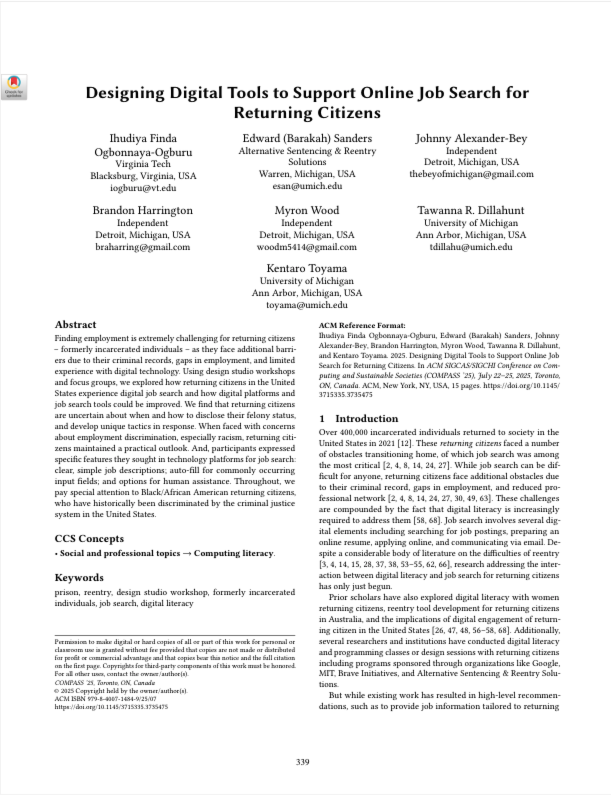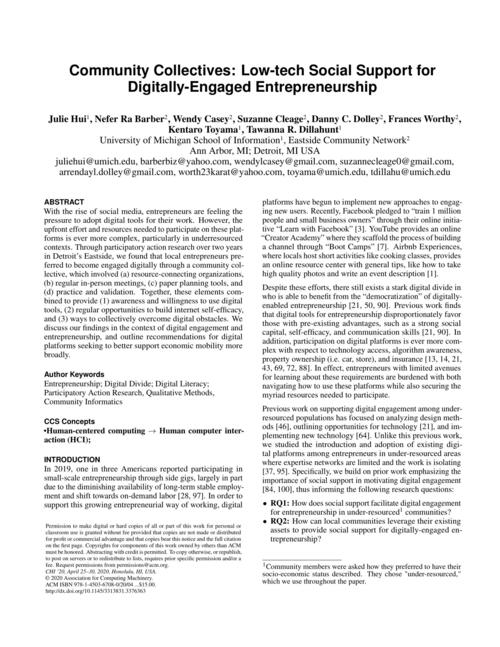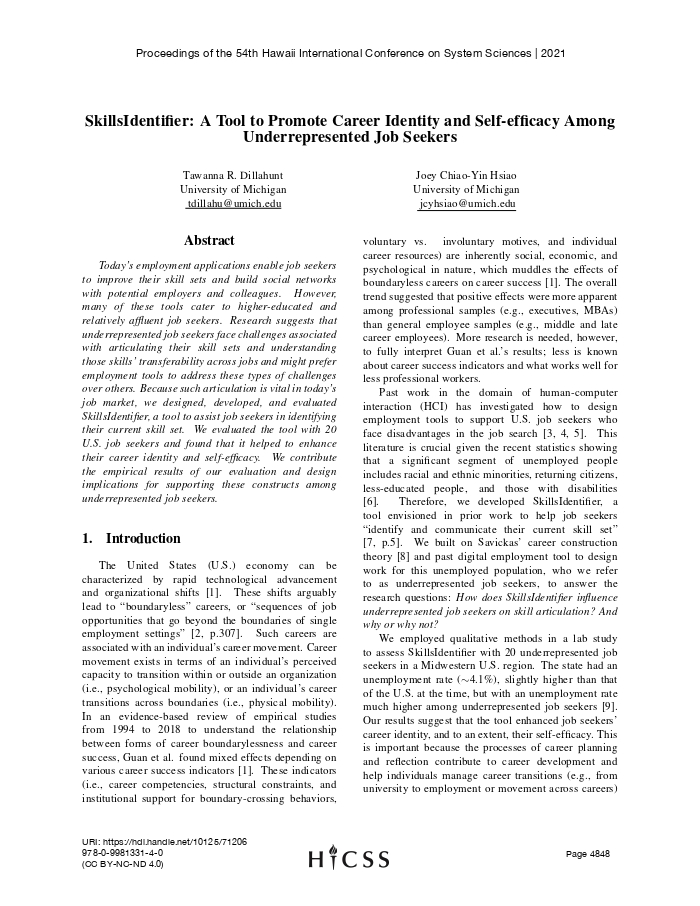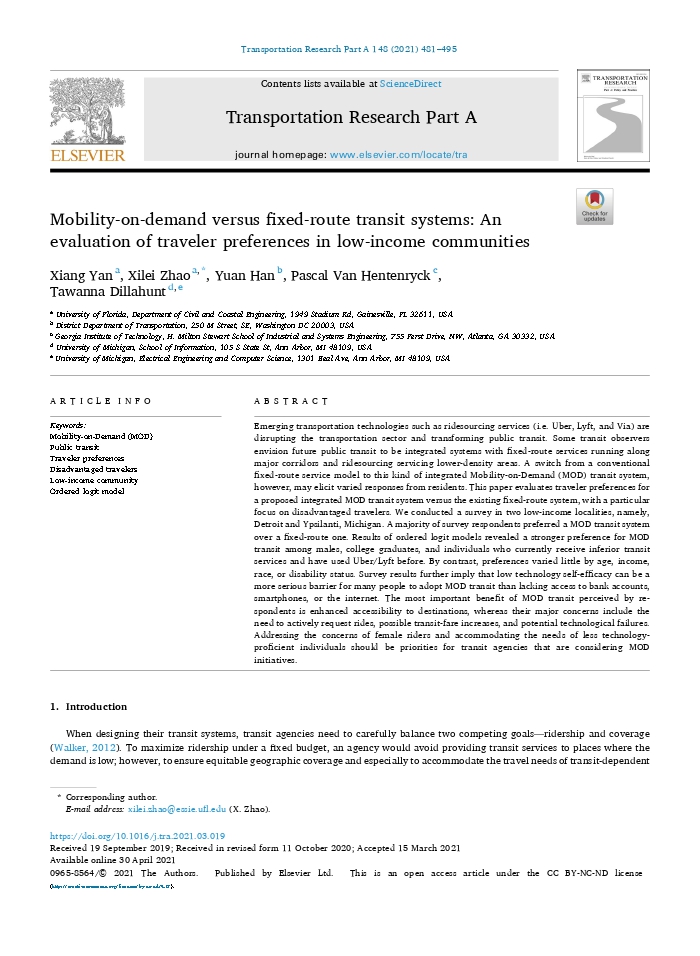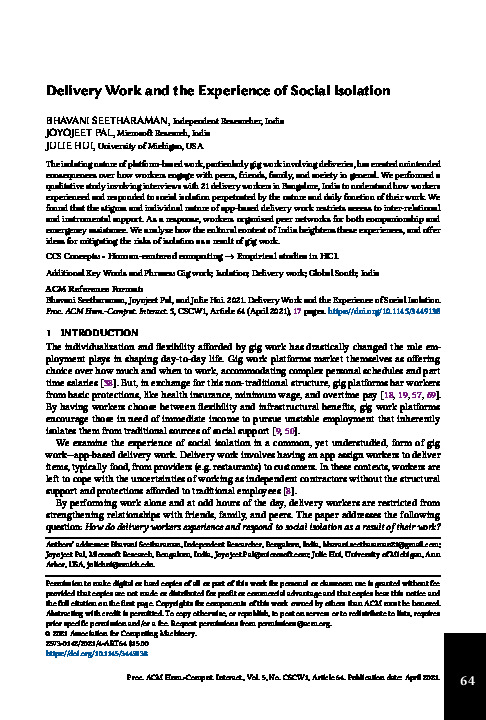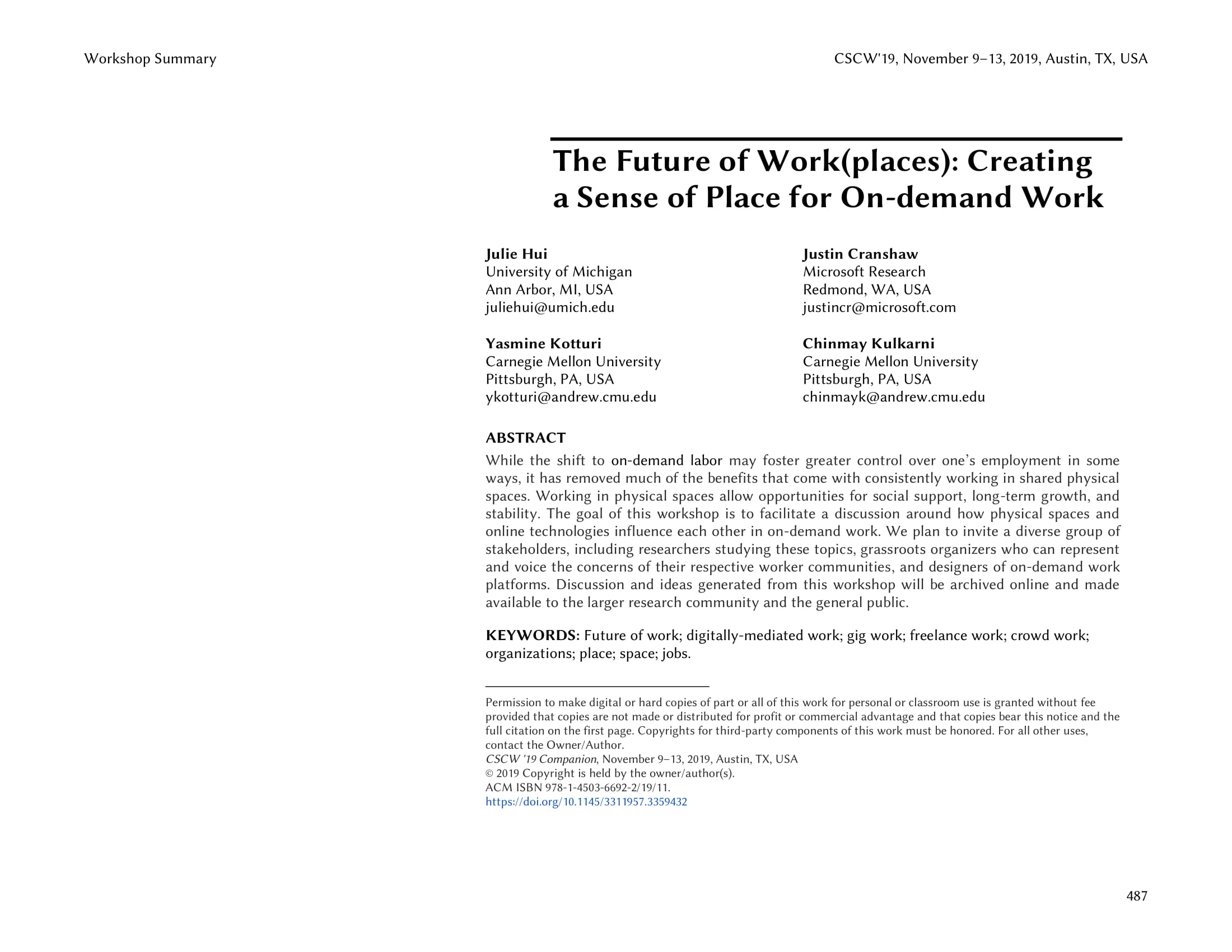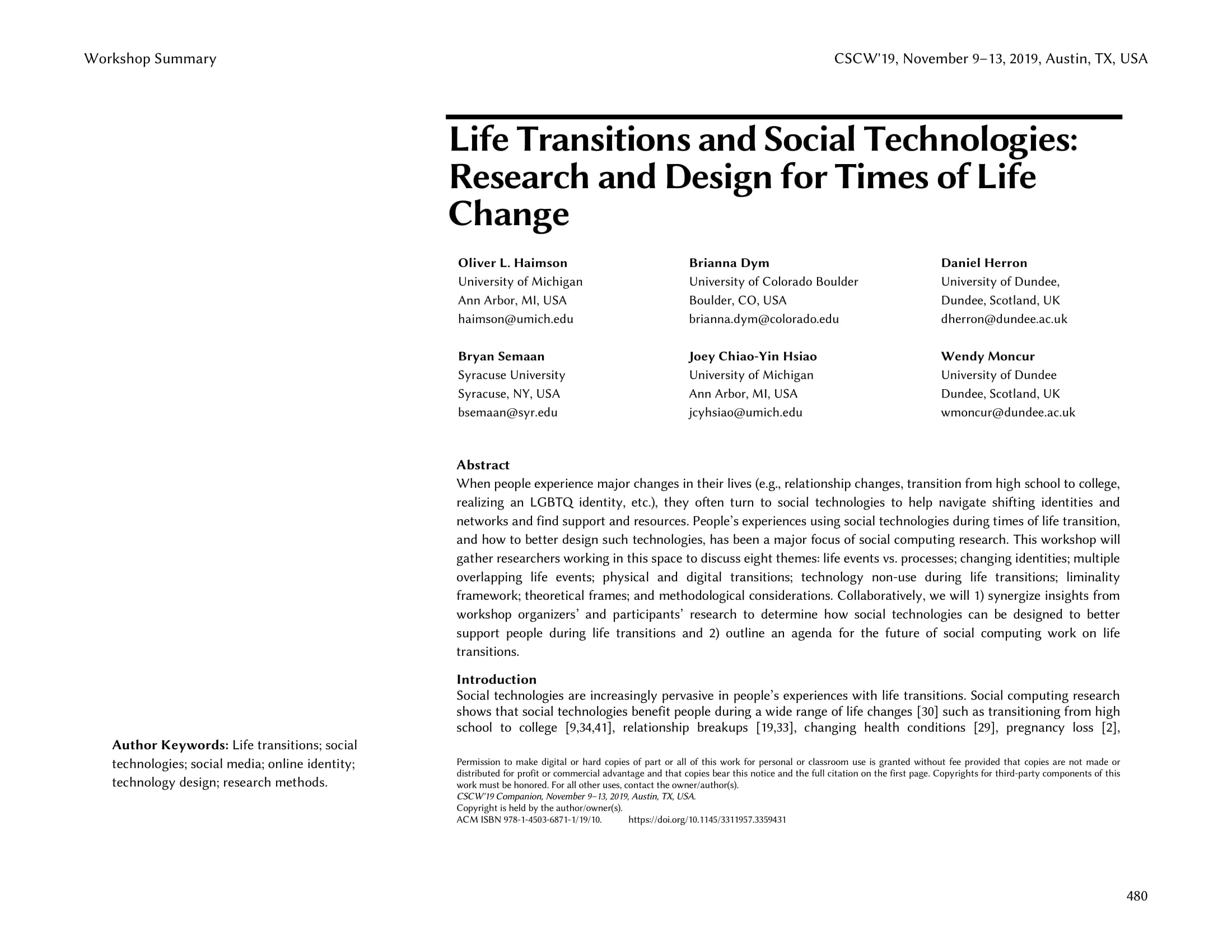
Decent work and Economic Growth
Inform efforts to promote sustained, inclusive, and sustainable economic growth, full and productive employment, and decent work for all
Related work
-
Designing Digital Tools to Support Online Job Search for Returning Citizens
Ihudiya Finda Ogbonnaya-Ogburu, Edward (Barakah) Sanders, Johnny Alexander-Bey, Brandon Harrington, Myron Wood, Tawanna R. Dillahunt, Kentaro Toyama
| in Proc. ACM COMPASS'25 | Finding employment is extremely challenging for returning citizens – formerly incarcerated individuals – as they face additional barriers due to their criminal records, gaps in employment, and limited experience with digital technology. Using design studio workshops and focus groups, we explored how returning citizens in the United States experience digital job search and how digital platforms and job search tools could be improved. We find that returning citizens are uncertain about when and how to disclose their felony status, and develop unique tactics in response. When faced with concerns about employment discrimination, especially racism, returning citizens maintained a practical outlook. And, participants expressed specific features they sought in technology platforms for job search: clear, simple job descriptions; auto-fill for commonly occurring input fields; and options for human assistance. Throughout, we pay special attention to Black/African American returning citizens, who have historically been discriminated by the criminal justice system in the United States. -
“I was able to give her the confidence”: Reciprocal-Capacity Building in a Community-based Program for Digital Engagement
Hui, J., Seefeldt, K., Sanifo, L., Baer, C., Szomstein, J., Dillahunt, T.R.
In Proc. of the CHI '24 Conference on Human Factors in Computing Assets-based approaches emphasize the importance of leverag- ing and building upon community strengths. We describe how a community-based digital capacity building program, Community Tech Workers (CTW), addresses the goals of assets-based devel- opment by hiring local residents and students to serve as tech support personnel for underserved minority small business own- ers in Detroit. Through interviews and observations, we examine how reciprocal relationships between tech workers and small busi- ness owners are critical to the success and sustainability of the program. We fnd that tech workers and business owners mutually beneft by 1) building confdence in technology together, 2) having business owners provide reciprocal guidance in professional devel- opment, and 3) fostering mutual appreciation and commitment to community development. We conclude by introducing the concept of reciprocal capacity building to HCI and discussing how it pro- vides a potentially more equitable approach to community-based interventions. -
Community Collectives: Low-tech Social Support for Digitally-Engaged Entrepreneurship
Hui, J., Barber, N. R., Casey, W., Cleage, S., Dolley, D. C., Worthy, F., Toyama, K., and Dillahunt T. R. (2020)
| In Proc. of the CHI '20 Conference on Human Factors in Computing Systems | With the rise of social media, entrepreneurs are feeling the pressure to adopt digital tools for their work. However, the upfront effort and resources needed to participate on these platforms is ever more complex, particularly in underresourced contexts. Through participatory action research over two years in Detroit’s Eastside, we found that local entrepreneurs preferred to become engaged digitally through a community collective, which involved (a) resource-connecting organizations, (b) regular in-person meetings, (c) paper planning tools, and (d) practice and validation. Together, these elements combined to provide (1) awareness and willingness to use digital tools, (2) regular opportunities to build internet self-efficacy, and (3) ways to collectively overcome digital obstacles. We discuss our findings in the context of digital engagement and entrepreneurship, and outline recommendations for digital platforms seeking to better support economic mobility more broadly. -
SkillsIdentifier: A Tool to Promote Career Identity and Self-efficacy Among Underrepresented Job Seekers
Dillahunt, T. R. and Hsiao, J. C.-Y. (2021)
| In Proc. of the 54th Hawaii International Conference on System Sciences | Today’s employment applications enable job seekers to improve their skill sets and build social networks with potential employers and colleagues. However, many of these tools cater to higher-educated and relatively affluent job seekers. Research suggests that underrepresented job seekers face challenges associated with articulating their skill sets and understanding those skills’ transferability across jobs and might prefer employment tools to address these types of challenges over others. Because such articulation is vital in today’s job market, we designed, developed, and evaluated SkillsIdentifier, a tool to assist job seekers in identifying their current skill set. We evaluated the tool with 20 U.S. job seekers and found that it helped to enhance their career identity and self-efficacy. We contribute the empirical results of our evaluation and design implications for supporting these constructs among underrepresented job seekers. -
Mobility-on-demand versus fixed-route transit systems: an evaluation of traveler preferences in low-income communities
Yan, X., Zhao, X., Han, Y., Van Hentenryck, P., and Dillahunt, T. R. (2021)
| In Publications of Poverty Solutions, University of Michigan | Emerging transportation technologies such as ridesourcing services (i.e. Uber, Lyft, and Via) are disrupting the transportation sector and transforming public transit. Some transit observers envision future public transit to be integrated systems with fixed-route services running along major corridors and ridesourcing servicing lower-density areas. A switch from a conventional fixed-route service model to this kind of integrated Mobility-on-Demand (MOD) transit system, however, may elicit varied responses from residents. This paper evaluates traveler preferences for a proposed integrated MOD transit system versus the existing fixed-route system, with a particular focus on disadvantaged travelers. We conducted a survey in two low-income localities, namely, Detroit and Ypsilanti, Michigan. A majority of survey respondents preferred a MOD transit system over a fixed-route one. Results of ordered logit models revealed a stronger preference for MOD transit among males, college graduates, and individuals who currently receive inferior transit services and have used Uber/Lyft before. By contrast, preferences varied little by age, income, race, or disability status. Survey results further imply that low technology self-efficacy can be a more serious barrier for many people to adopt MOD transit than lacking access to bank accounts, smartphones, or the internet. The most important benefit of MOD transit perceived by re- spondents is enhanced accessibility to destinations, whereas their major concerns include the need to actively request rides, possible transit-fare increases, and potential technological failures. Addressing the concerns of female riders and accommodating the needs of less technology- proficient individuals should be priorities for transit agencies that are considering MOD initiatives. -
Delivery Work and the Experience of Social Isolation
Seetharaman, B., Pal, J., and Hui., J. (2021)
| In Proc. of the ACM'21 Conference on Human Computer Interaction, CSCW 1 | The isolating nature of platform-based work, particularly gig work involving deliveries, has created unintended consequences over how workers engage with peers, friends, family, and society in general. We performed a qualitative study involving interviews with 21 delivery workers in Bangalore, India to understand how workers experienced and responded to social isolation perpetuated by the nature and daily function of their work. We found that the stigma and individual nature of app-based delivery work restricts access to inter-relational and instrumental support. As a response, workers organized peer networks for both companionship and emergency assistance. We analyze how the cultural context of India heightens these experiences, and offer ideas for mitigating the risks of isolation as a result of gig work. -
Promise of the Sharing Economy among Disadvantaged Communities
Dillahunt, T. R. and Malone, A. R. (2015)
| In Proc. of ACM CHI '15 Conference on Human Factors in Computing Systems | The digital-sharing economy presents opportunities for individuals to find temporary employment, generate extra income, increase reciprocity, enhance social interaction, and access resources not otherwise attainable. Although the sharing economy is profitable, little is known about its use among the unemployed or those struggling financially. This paper describes the results of a participatory-design based workshop to investigate the perception and feasibility of finding temporary employment and sharing spare resources using sharing-economy applications. Specifically, this study included 20 individuals seeking employment in a U.S. city suffering economic decline. We identify success factors of the digital-sharing economy to these populations, identify shortcomings and propose mitigation strategies based on prior research related to trust, social capital and theories of collective efficacy. Finally, we contribute new principles that may foster collaborative consumption within this population and identify new concepts for practical employment applications among these populations. -
Entrepreneurship and the Socio-Technical Chasm in a Lean Economy
*Honorable Mention* | Dillahunt, T. R., Kameswaran, V., McLain, D., Lester, M., Orr, D., and Toyama, K. (2018)
| In proc. of CHI '18 Conference on Human Factors in Computing Systems | Online technologies are increasingly hailed as enablers of entrepreneurship and income generation. Recent evidence suggests, however, that even the best such tools disproportionately favor those with pre-existing entrepreneurial advantages. Despite intentions, the technology on its own seems far from addressing socio-economic inequalities. Using participatory action research, we investigated why this might be, in an intimate, close-up context. Over a 1-year period, we— a collaborative team of university researchers and residents of Detroit’s East Side—worked to establish a neighborhood tour whose initial goal was to raise supplementary income and fundraise for community block clubs. We found that in addition to technical requirements, such as communication tools, a range of non-technological efforts is needed to manage projects, build self-efficacy, and otherwise support community participants. Our findings widen Ackerman’s “socio-technical gap” for some contexts and offer a counterpoint to overgeneralized claims about well-designed technologies being able to address certain classes of social challenges. -
The Future of Work(places): Creating a Sense of Place for On-demand Work
Hui, J., Cranshaw, J., Kotturi, Y., and Kulkarni, C. (2019)
| In Proc. of CSCW '19 Companion Conference on Computer Supported Cooperative Work and Social Computing | While the shift to on-demand labor may foster greater control over one’s employment in some ways, it has removed much of the benefits that come with consistently working in shared physical spaces. Working in physical spaces allow opportunities for social support, long-term growth, and stability. The goal of this workshop is to facilitate a discussion around how physical spaces and online technologies influence each other in on-demand work. We plan to invite a diverse group of stakeholders, including researchers studying these topics, grassroots organizers who can represent and voice the concerns of their respective worker communities, and designers of on-demand work platforms. Discussion and ideas generated from this workshop will be archived online and made available to the larger research community and the general public. -
Life Transitions and Social Technologies: Research and Design for Times of Life Change
Haimson, O. L., Semaan, B., Dym, B., Hsiao, J. C.-Y., Herron, D., and Moncur, W. (2019)
| In Proc. of CSCW '19 Companion Conference on Computer Supported Cooperative Work and Social Computing | When people experience major changes in their lives (e.g., relationship changes, transition from high school to college, realizing an LGBTQ identity, etc.), they often turn to social technologies to help navigate shifting identities and networks and find support and resources. People’s experiences using social technologies during times of life transition, and how to better design such technologies, has been a major focus of social computing research. This workshop will gather researchers working in this space to discuss eight themes: life events vs. processes; changing identities; multiple overlapping life events; physical and digital transitions; technology non-use during life transitions; liminality framework; theoretical frames; and methodological considerations. Collaboratively, we will 1) synergize insights from workshop organizers’ and participants’ research to determine how social technologies can be designed to better support people during life transitions and 2) outline an agenda for the future of social computing work on life transitions.
